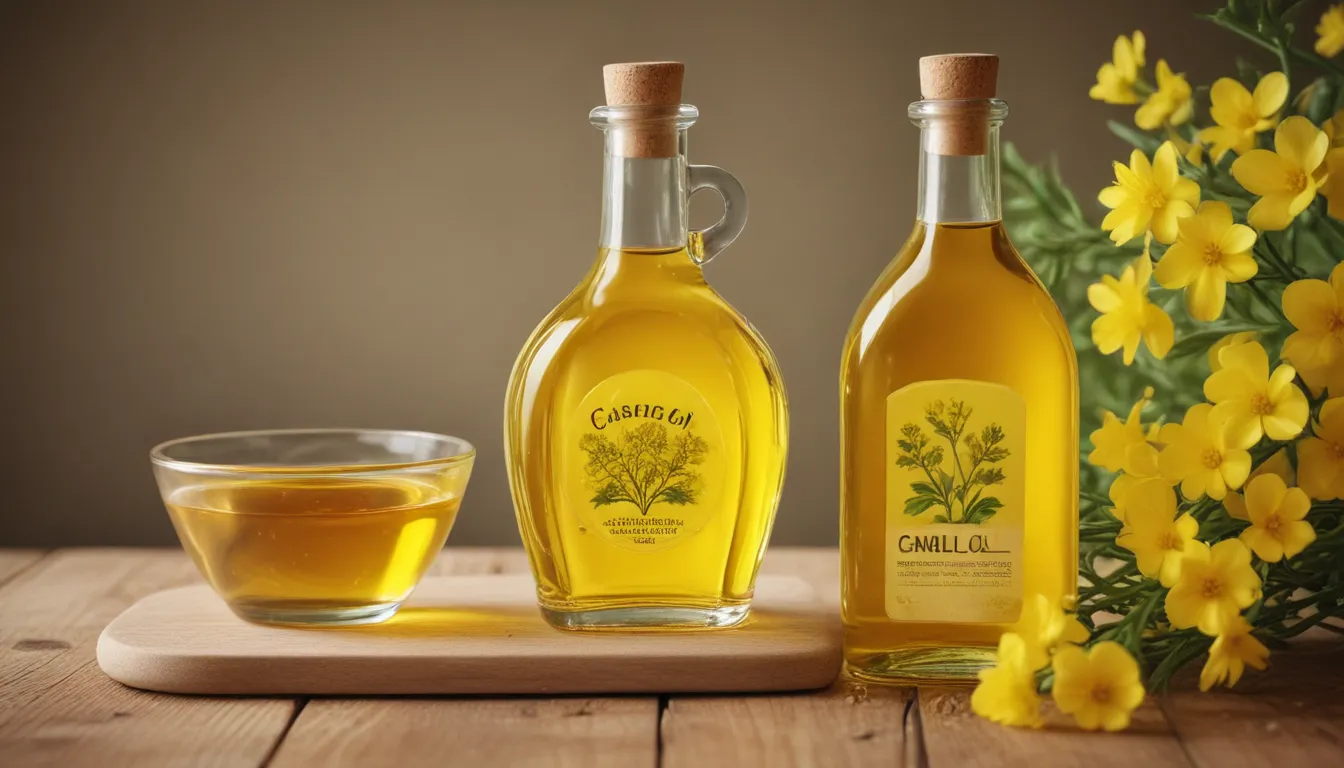The pictures in our articles might not always show exactly what the text is talking about. We use these images to make the article more interesting and eye-catching. They are there to add to the text, but not to replace it or show every detail.
Welcome to the world of canola oil – a popular choice for cooking enthusiasts and health-conscious individuals alike. Derived from the seeds of the canola plant, this versatile oil has gained recognition for its nutritional profile and culinary benefits. In this article, we will explore 13 fascinating facts about canola oil that will enhance your understanding of this kitchen staple. From its origins and health advantages to its applications in cooking and sustainability, we will uncover valuable insights into the world of canola oil. So, let's embark on a journey to discover what makes canola oil a noteworthy ingredient in the culinary landscape.
Key Takeaways:
- Canola oil is a heart-healthy cooking option due to its low saturated fat and high monounsaturated fat content, making it great for various cooking methods and beneficial for cardiovascular health.
- Canola oil is a versatile and sustainable choice, widely available and affordable, with a long shelf life and cholesterol-free properties, making it a popular option for healthier cooking and salad dressings.
The Origins of Canola Oil:
Canola oil is derived from the seeds of the canola plant, a type of rapeseed. These seeds undergo a process of crushing, extraction, refinement, and packaging to produce the final oil used for consumption.
Health Benefits of Canola Oil:
- Canola oil is low in saturated fat, making it a healthier option compared to other cooking oils.
- It is rich in monounsaturated fats, which are beneficial for heart health by lowering bad cholesterol levels and reducing the risk of cardiovascular diseases.
Cooking with Canola Oil:
- Canola oil has a high smoke point of around 400°F, making it suitable for high-heat cooking methods like frying and grilling.
- Its mild flavor and versatility allow it to be used in baking, sautéing, and salad dressings, enhancing the taste of dishes without overpowering other ingredients.
Nutritional Value of Canola Oil:
- Canola oil is a good source of vitamin E, a powerful antioxidant that helps protect the body against oxidative stress.
- It contains a favorable omega-6 to omega-3 fatty acid ratio, essential for maintaining a healthy balance and reducing inflammation for improved cardiovascular health.
Sustainability of Canola Oil:
Canola plants are known for their high oil yield and low environmental impact, requiring less water and pesticides compared to other oilseed crops. This makes canola oil a sustainable choice for conscientious consumers.
Additional Facts about Canola Oil:
- Canola oil is commonly used in the food industry for its neutral flavor and versatility, found in processed foods, margarine, dressings, and snacks.
- It has a long shelf life thanks to its high stability and is completely cholesterol-free, making it suitable for individuals with high cholesterol levels.
Conclusion:
In conclusion, canola oil stands out as a versatile and nutritious cooking oil with numerous benefits and uses. Its low saturated fat content, high monounsaturated fats, essential fatty acids, and vitamin E make it a healthier alternative to other oils. Additionally, its high smoke point and mild flavor make it suitable for various cooking methods, including deep-frying and baking. By incorporating canola oil into your diet in moderation, you can enjoy its health benefits while enhancing the flavors of your favorite dishes.
FAQs about Canola Oil:
- Is canola oil the same as rapeseed oil? Canola oil is derived from a variety of rapeseed with low levels of erucic acid and glucosinolates, making it safe for consumption.
- Does canola oil contain omega-3 fatty acids? Yes, canola oil is a good source of omega-3 fatty acids, particularly alpha-linolenic acid.
- Is canola oil suitable for high-temperature cooking? Yes, canola oil has a high smoke point, making it ideal for frying and sautéing.
- Is canola oil healthy to consume? Canola oil is considered a healthy choice due to its nutritional profile, but moderation is key in a balanced diet.
- Can canola oil be used in baking? Yes, canola oil's neutral flavor and light texture make it a versatile option for baking.
- Is canola oil sustainable? Yes, canola oil production has a lower environmental impact, making it a sustainable choice.
- Can individuals with allergies consume canola oil? Canola oil is generally safe for individuals with allergies, but caution is advised, especially for severe allergies.
As you explore the benefits of canola oil, consider incorporating it into your cooking routine for a healthier and more flavorful culinary experience. Whether you're sautéing, baking, or making salad dressings, canola oil's versatility and health advantages make it an excellent choice for conscious cooks. Elevate your cooking game while prioritizing your well-being with the inclusion of canola oil in your kitchen arsenal.






